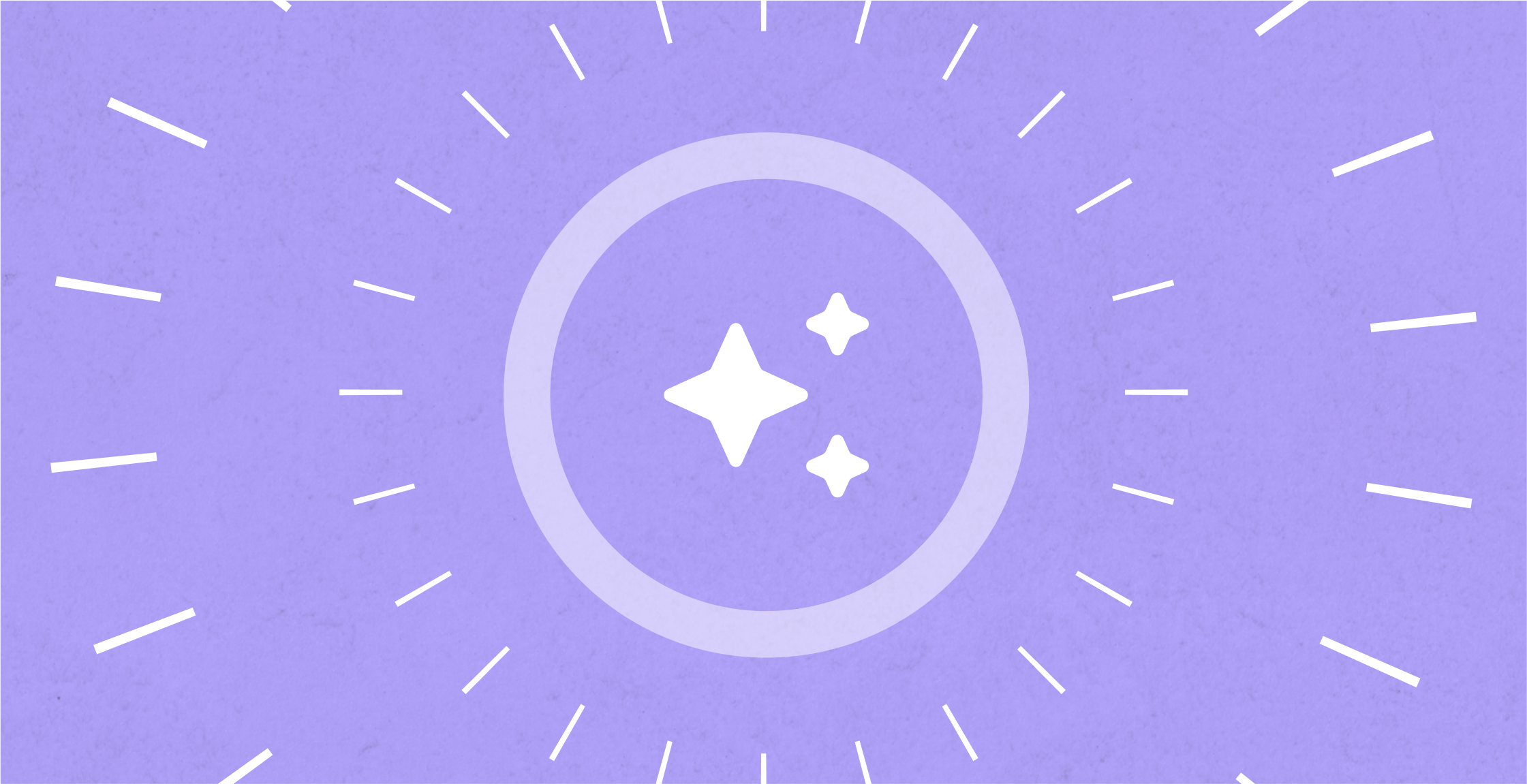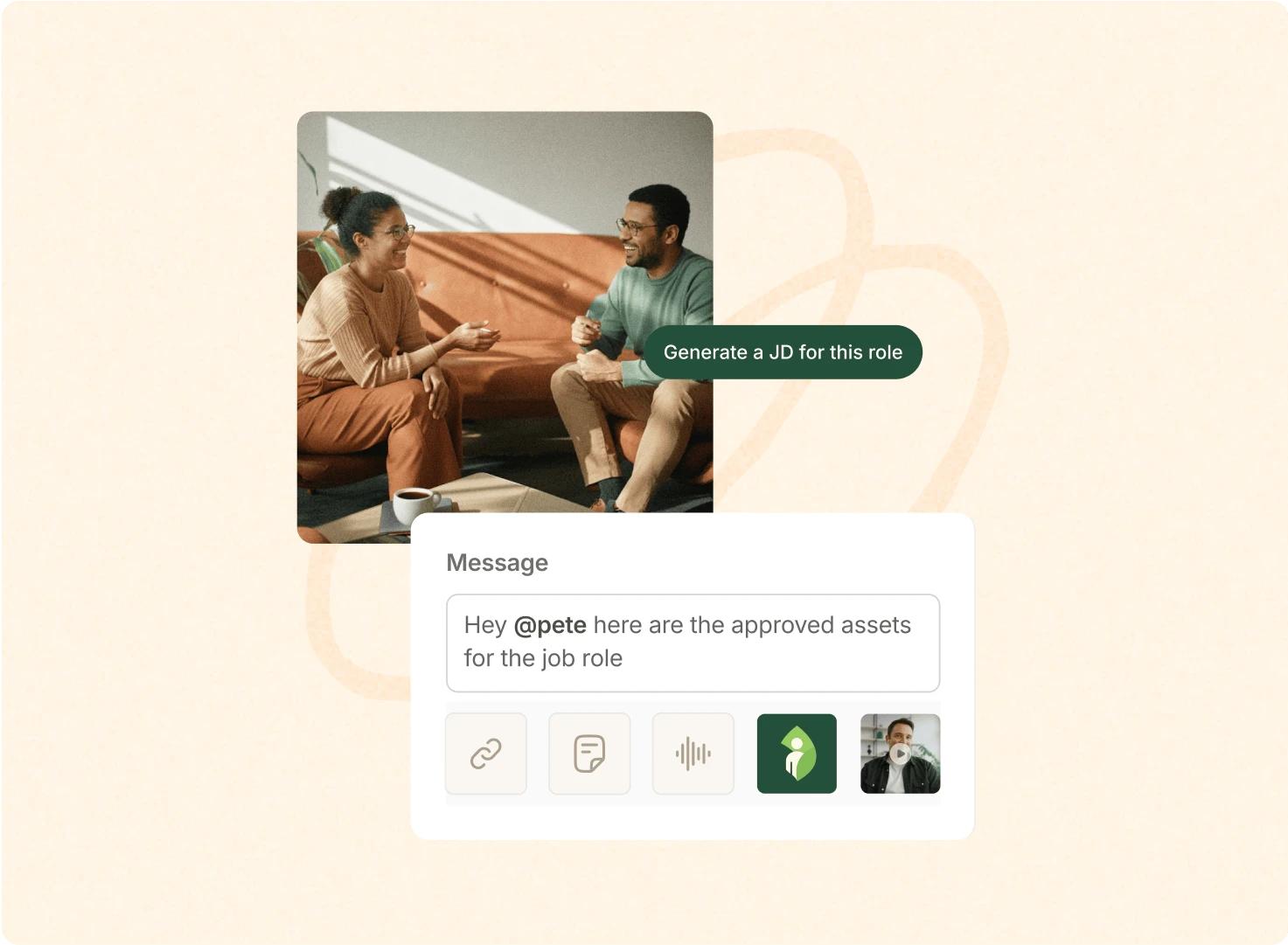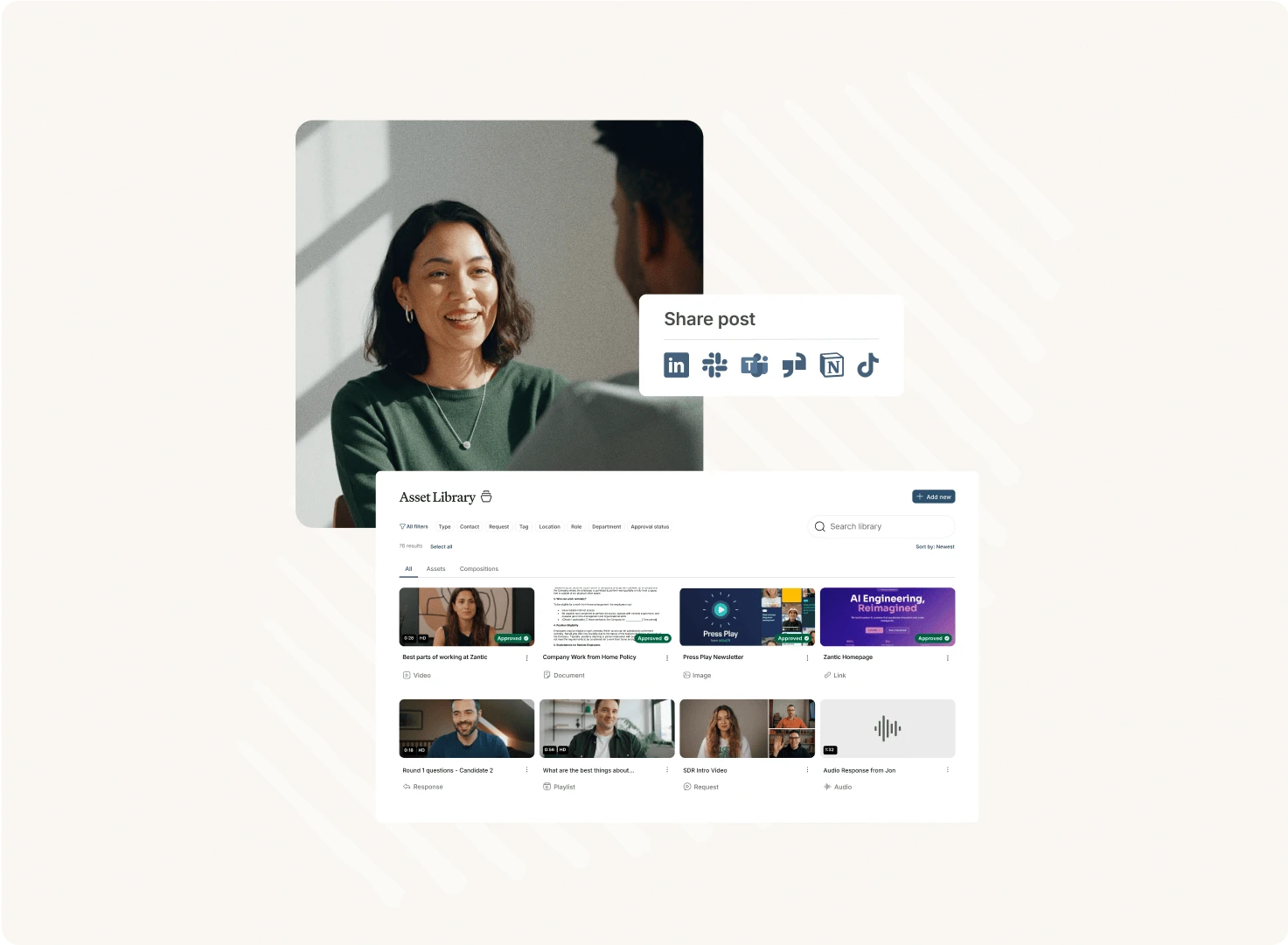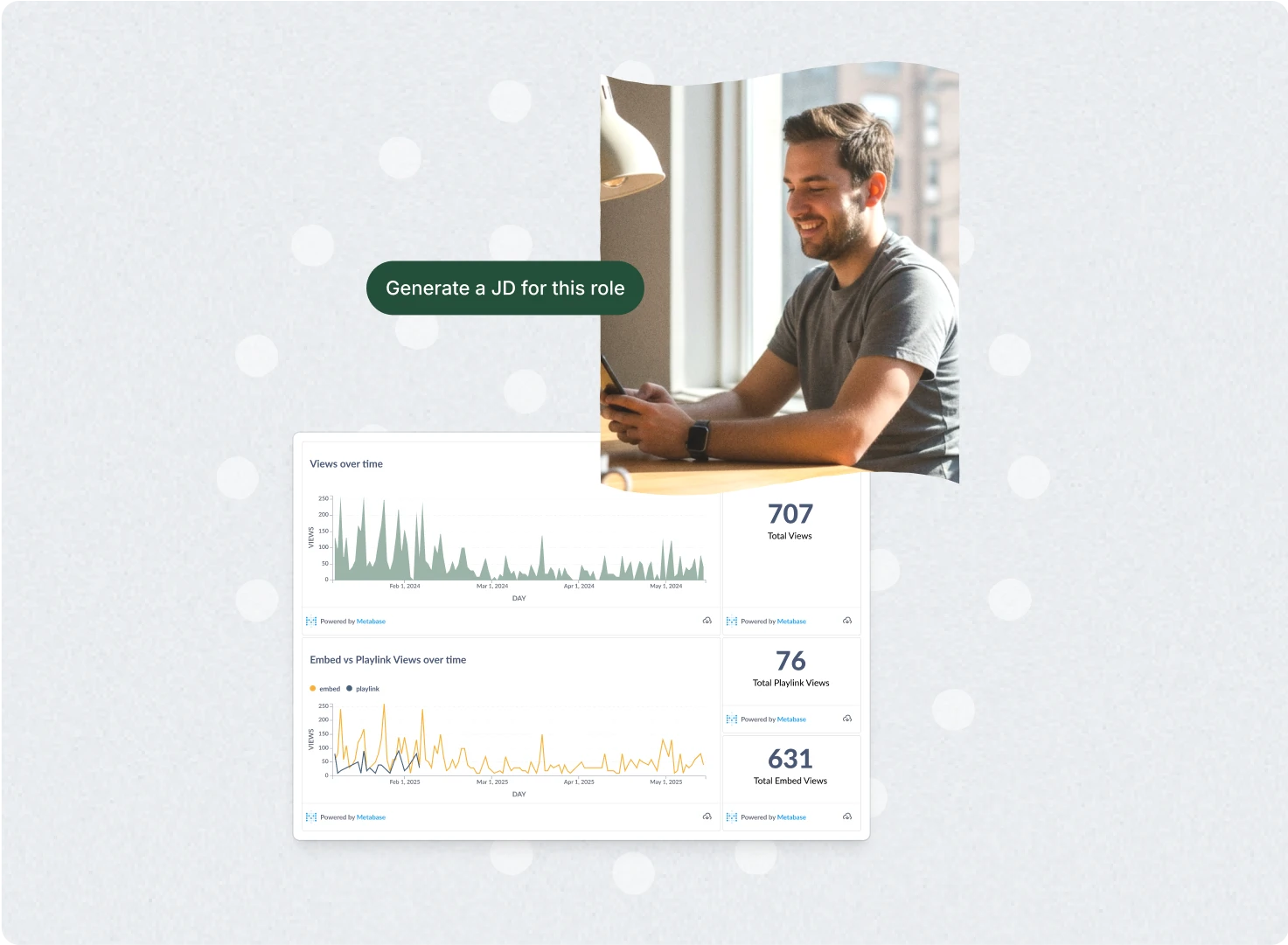Even if you don't actively use AI, Artificial intelligence (AI) is already an integral part of our daily lives.
From voice assistants like Alexa to self-driving cars, AI tools like ChatGPT have transformed how we gather information.
AI is now auto-completing our emails for us and even editing your videos for you!
The future is already here, and today, we're exploring AI recruiting and how it can be used in the talent acquisition process.
And the good news for HR people, is that AI is likely never going to replace people, as HR is built on a "human touch".
So let's get started.
Key Highlights
- AI recruiting is the use of artificial intelligence to help recruiters streamline and automate repetitive tasks.
- AI can automate repetitive tasks, such as resume screening and candidate outreach, allowing recruiters to focus on building relationships.
- AI can help craft job descriptions and optimize them for inclusivity using natural language processing.
- AI can help screen candidates at scale by analyzing resumes and conducting video interviews.
- AI can be found in all kinds of tools, including video recruitment tools like Vouch with AI editing and highlight reels.
How Much Are U.S. Companies Investing Into AI?
According to a Deloitte survey, about 67% of companies in the United States are currently investing in AI recruiting.
Monetary-wise, in 2021, IDC reported that companies' AI spending was estimated to be around $50 billion.
IDC then reported that global spending on AI systems was expected to reach $98 billion in 2023, almost double.
In 2026, we believe this will be exponential, and it will be for many years to come.
The AI-enabled workspace for talent teams.
- Unified workspace for talent teams
- Accelerate hiring with AI tools
- Auto-generate polished hiring and employer brand content
- Easily repurpose assets across all channel
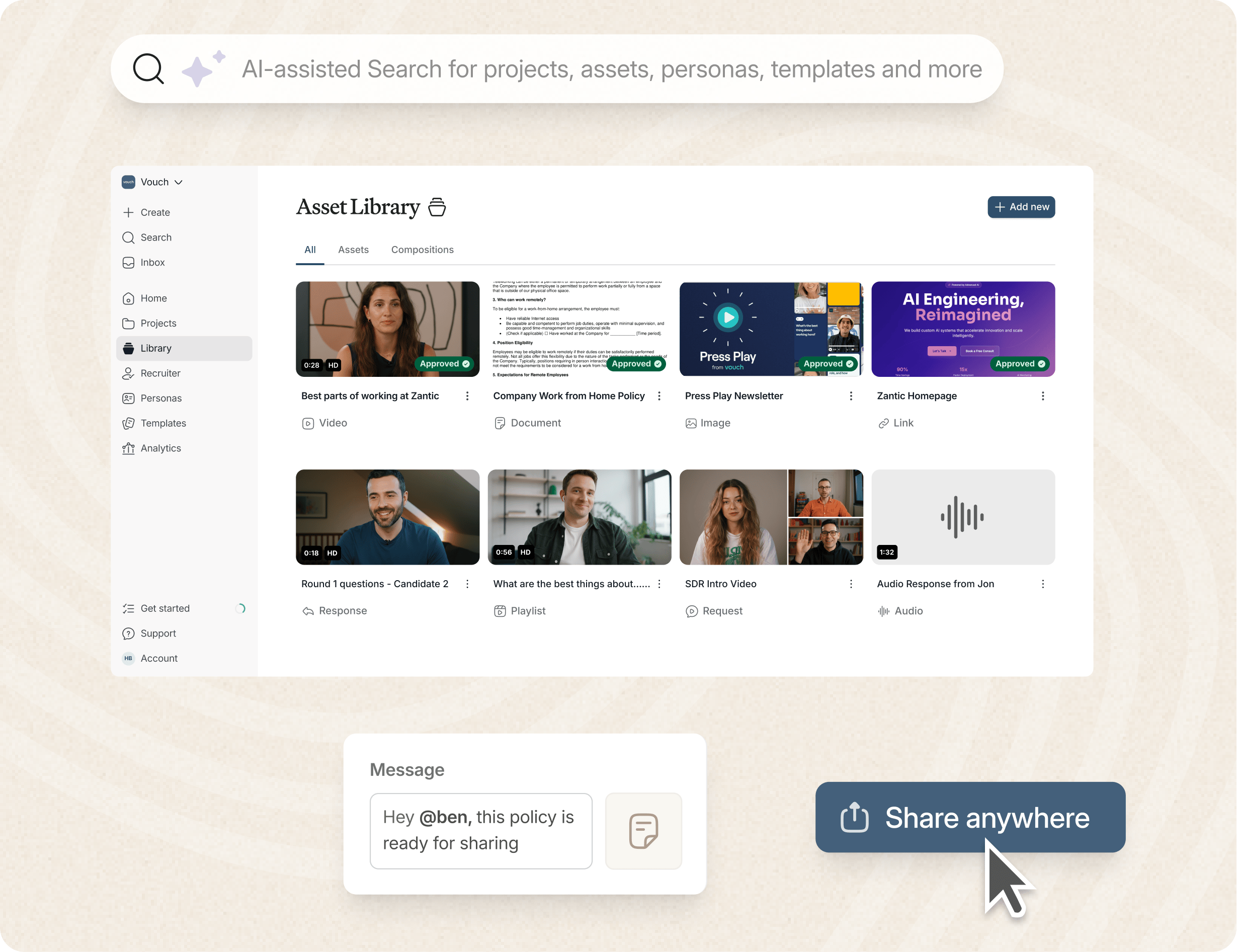
5 Key Benefits: How Does AI Recruiting Help?
Human resources (HR) professionals were one of the first to understand the value of leveraging AI-powered tools to automate time-consuming tasks and make data-driven decisions.
AI recruiting software can also analyze large volumes of data to identify patterns and trends, allowing HR professionals to make more informed decisions and remove biases.
Here are five ways AI can help in your recruitment processes:
1) Firstly, AI helps you automate your repetitive tasks
From candidate outreach to resume screening, AI can save you time across most recruitment steps.
Here are a few ways AI can help automate your repetitive tasks:
- Automated resume screening: AI algorithms can scan and analyze resumes, identifying qualified candidates based on predefined criteria.
- Automated candidate outreach: AI-powered chatbots can engage with candidates, answer common questions, and schedule interviews.
- Automated interview scheduling: AI can analyze calendars and find optimal meeting times for both recruiters and candidates.
- Automated data entry: AI can automatically extract relevant information from resumes and transfer it to applicant tracking systems.
- Automated follow-ups: AI-powered tools can send candidates automated follow-up emails or messages, keeping them engaged throughout the hiring process.
By automating these repetitive tasks, AI and recruitment enablement strategies frees up recruiters' time, allowing them to focus on more strategic activities that require human judgment and interaction.
2) AI can help you craft better job descriptions
AI is brilliant when it comes to crafting job descriptions.
By leveraging AI to craft job descriptions, you can attract candidates who are a better fit for your role and company.
Adding a human touch is still essential in 2026, but here's how AI can help:
- Natural language processing: AI-powered tools can analyze job descriptions and suggest revisions to ensure they are clear, concise, and inclusive.
- Keyword optimization: AI algorithms can identify relevant keywords that will help your job posting rank higher in search results.
- Employer branding: AI can analyze your company's brand and culture to help tailor job descriptions that align with your organization's values and attract candidates who are a good fit.
- Inclusivity and diversity: AI can detect biased language and provide suggestions for more inclusive wording, promoting diversity and attracting a wider range of candidates.
3) AI can streamline your advertising
AI can rapidly streamline your advertising process by targeting specific audiences on social media platforms and job boards.
Here's how AI can help streamline your advertising efforts:
- Targeted advertising: AI algorithms can analyze candidate data and behavior to identify the most relevant platforms and channels for advertising job openings.
- Personalized messaging: AI can generate personalized messaging to engage with potential candidates and capture their interest.
- Optimized ad placements: AI-powered tools can automate the placement of job ads on various platforms, ensuring maximum visibility and reach.
- Data-driven insights: AI can analyze the performance of your ads and provide insights on engagement, conversion rates, and return on investment.
By using AI to streamline advertising, recruiters can reach a wider audience and attract qualified candidates more effectively, ultimately improving the overall efficiency of the recruitment process.
4) AI can help with candidate screening at scale
By leveraging AI for candidate screening, recruiters can efficiently review a large volume of resumes and identify the most qualified candidates, saving vast amounts of time and resources.
Here's how AI can help with screening:
- Resume screening: AI algorithms can parse resumes and analyze them against predefined criteria, identifying the most qualified candidates.
- Keyword analysis: AI can analyze resumes for specific keywords and skills, allowing recruiters to quickly identify candidates who meet the job requirements.
- Automated shortlisting: AI-powered tools can automatically shortlist candidates based on predefined criteria, reducing manual effort.
- Candidate ranking: AI algorithms can rank candidates based on their qualifications and suitability for the role, helping recruiters prioritize the most promising candidates.
5) AI can help reduce unconscious bias for diversity and inclusion
Unconscious bias can inadvertently influence hiring decisions, leading to a lack of diversity and inclusion in the workforce.
AI can help mitigate unconscious bias and promote diversity in the recruitment process.
Here's how AI can help:
- Objective decision-making: AI algorithms make decisions based on data and predefined criteria, reducing the influence of human bias.
- Anonymous candidate screening: AI-powered tools can remove identifying information from resumes, ensuring that candidates are evaluated solely based on their qualifications and experience.
- Inclusive language analysis: AI can analyze job descriptions and identify biased language, helping recruiters create more inclusive job postings.
- Diverse candidate sourcing: AI algorithms can search for candidates based on specific criteria, promoting diversity in the candidate pool.
What AI Tools Are Used In Recruitment?
Lots of AI-powered tools play a significant role in the modern recruitment process!
For example, resume screening software utilizes AI algorithms to analyze resumes and identify qualified candidates based on predefined criteria.
Video tools like Vouch utilize AI for faster video editing and highlight reels, which can be easily shared with your wider team.
Chatbots like these can engage with candidates, answer questions, and provide information about the company and the hiring process.
Application tracking systems (ATS) automate and streamline the recruitment process by tracking candidates, managing applications, and facilitating communication.
We're just scratching the surface here, but these popular AI tools provide valuable support to recruiters, throughout the entire recruitment process.
What Is The Future of AI in Recruitment?
The future of AI in recruitment is bright, and people will always be vital in this industry.
AI really takes the support role when it comes to recruitment and talent acquisition.
Here are some key trends to keep a close eye on:
- Enhanced Candidate Matching: AI will become more sophisticated in matching candidates with job requirements, considering not just skills and experience but also cultural fit and potential for growth within the organization.
- Improved Candidate Experience: AI-powered chatbots and virtual assistants will continue to enhance the candidate experience by providing real-time communication, answering questions, and guiding candidates through the application process.
- Bias Reduction: AI tools are being developed to minimize bias in the recruitment process, helping to ensure fairer evaluations of candidates based on their qualifications and potential.
- Predictive Analytics: AI will increasingly be used to predict future hiring needs based on historical data, allowing companies to better plan their recruitment strategies.
- Automation of Routine Tasks: AI will continue to automate time-consuming tasks such as resume screening, interview scheduling, and application tracking, allowing recruiters to focus more on strategic and human-centric aspects of their roles.
- Skill Development and Training: AI can assist in identifying skill gaps within an organization and recommend training programs or learning resources to up-skill employees, thus reducing the need for external hiring.
How Do You Choose Which AI Recruiting Platforms To Use?
Like any new system or process, choosing the right AI recruiting platform can be a daunting task.
Often, it's best to stick to the big ones (a few linked above).
Still, it usually takes an IT team to evaluate the right tools for your company, considering employee UX and essentials like security risks.
Here are some factors to consider when selecting an AI recruiting platform:
- Features: Assess the platform's features, such as resume screening, candidate sourcing, and interview analytics.
- Integration: Consider whether the platform integrates with your existing HR technology stack, such as your applicant tracking system (ATS) or video interviewing tools.
- User experience (UX): Evaluate the platform's user interface to ensure it is user-friendly and intuitive for both recruiters and candidates.
- Support and training: Look for platforms that offer comprehensive support and training to help you maximize the benefits of using AI in your recruitment process.
- Scalability: Consider whether the platform can grow with your organization and accommodate your evolving recruitment needs.
What Are The Best Practices For Adopting AI Tools?
To effectively adopt AI tools in the recruitment process, your need to consider policy and cyber security issues.
A high-level process could be:
- Define objectives: Clearly define your recruitment objectives and identify how AI tools can help you achieve them.
- Train your team: Provide comprehensive training to your hiring team on how to effectively use AI tools and integrate them into their workflow.
- Evaluate performance: Regularly evaluate the performance and impact of AI tools on your recruitment process and make necessary adjustments.
- Ensure data privacy: Implement data privacy protocols to protect candidate information and comply with data protection regulations.
- Maintain human interaction: While AI tools can streamline and automate certain tasks, maintaining human interaction and judgment is crucial to ensure a positive candidate experience.
Should You Use AI Video Tools For Recruiting?
Absolutely, video recruitment tools can help in many ways, including removing bias.
Video can also be used to enhance the candidate engagement and interview process at scale.
Here are some more powerful reasons to add video to your recruitment mix:
- Real-time video analysis: AI algorithms can analyze candidates' facial expressions, speech patterns, and body language during video interviews, providing insights to assess their suitability for the role.
- Generative AI: AI-powered tools can generate dynamic video content, such as personalized interview introduction videos or virtual office tours, to engage candidates and showcase the company culture.
- Automated video editing: AI technology can automate the editing process, allowing recruiters to quickly compile and edit video interview recordings, saving time and effort.
FAQs
What is AI for recruiting?
AI for recruiting is the use of artificial intelligence to streamline and enhance the hiring process, including helping with resume screening, candidate engagement, and unbiased interview analysis.
How does AI help in improving the candidate selection process?
AI helps improve the candidate selection process by automating tasks such as resume screening and identifying qualified candidates based on your predefined criteria.
What are the potential challenges of using AI in recruiting?
Challenges of using AI in recruiting include:
- Ensuring a positive candidate experience.
- Navigating implementation obstacles.
- Addressing concerns around data privacy and human bias.
Will AI replace human recruiters?
AI will not replace human recruiters anytime soon, as the human touch is a must in any HR role. Instead, AI will complement your work by automating repetitive tasks and providing valuable insights to support your decision-making.
How can small businesses benefit from AI in recruiting?
Small businesses can benefit from AI in recruiting by streamlining their hiring process, automating repetitive tasks, and accessing a larger pool of qualified candidates.
How to ensure ethical AI use in recruitment?
To ensure ethical AI use in recruitment, organizations should regularly audit AI algorithms for biases, protect candidate data, and maintain human oversight in decision-making.
Conclusion
AI recruiting is quickly changing the hiring process by leveraging advanced technology to streamline tasks, enhance candidate selection, and promote diversity.
By embracing AI tools, you can automate many repetitive tasks, like creating tailored job descriptions and improving the overall efficiency of your recruitment efforts.
Video is also a game-changer when it comes to AI recruitment, and this is also where modern tools like Vouch make life so much easier.
Like to try Vouch AI?
Loved by companies like Canva, Nike, Cisco, HubSpot, Amazon, and more, tools like Vouch make leveraging video in your business remarkably easy.
Be sure to book a Vouch demo today to chat with a video content expert.
You might also like

Elevate Your Brand Today With Vouch
Discover how Vouch can accelerate talent acquisition while helping you stay on-brand.


